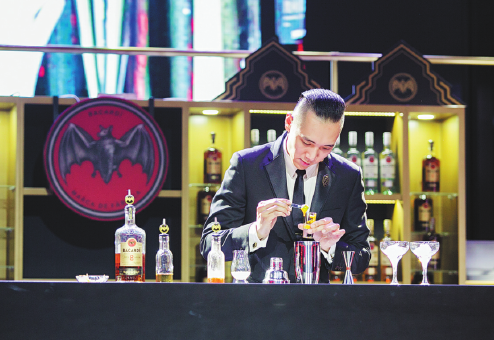Mixology picks up steam


Xie says such cocktail competitions are good for the industry as they encourage young bartenders to learn from their foreign peers and challenge themselves creatively. Being a part of the event also helps to raise one's profile.
Huang Xiao, 28, who works at Shanghai's Above the Globe, used to be an accountant before she made the switch to bartending four years ago. As one of the growing number of female bartenders who have made bartending a full-time profession, Huang says her job satisfaction comes from seeing customers enjoy her creations and receiving recognition from being a part of the competition.
The winner of this year's China final was Huang Xiaoyang, who works at the Lab Loft Bar in Shenzhen, Guangdong province. The 23-year-old suggested that though the hours are long and the pay barely decent, it is his love for creativity and chasing his passion that keeps him motivated.
"My inspiration comes from my desire for continuous learning. What you pay this moment is what you will get in the future," says Huang Xiaoyang.
"Even though I now live in a 3-square-meter rented room, my soul is free and I have great vision. I want to learn about anything that I'm interested in."
According to Wong, one of the factors behind the growing popularity of cocktails in China is the shift in consumption patterns. He notes that Chinese consumers have become more adventurous and sophisticated.
Guangzhou bartender Li Jiahao, 34, shares the same sentiment. "About 10 years ago, Chinese customers frequented noisy clubs and discotheques. But in recent years, customers are finding it more appealing to go to a quiet bar and savor wines and spirits," Li says.
Han recalls that the objective of many consumers in the past was simply to get drunk. Today, people are more interested in exploration.
"Customers are more know-ledgeable than before. They know what kind of flavors they like to drink. They often get me to make a customized drink for them instead of picking one that is on the menu," he says.
Xie points out that Shanghai, owing to its cosmopolitan nature, is presently the Chinese city with the most vibrant cocktail scene. Of the four cocktail bars in the mainland that made it to the Asia's 50 Best Bars 2018 list, three are located in Shanghai - Speak Low, Sober Company and Union Trading Company. Beijing's Janes and Hooch moved up three spots from last year's rankings to occupy 30th place this year.
"Shanghai boasts the most number of bars, including good quality ones. In Shanghai, bartenders will have more opportunities to join master classes or trainings," he says.
Unlike in the West, bartending is still an emerging industry in China, says Wong, noting that cocktail bars only started to open in China in the past two decades. While most cocktail drinkers are from the big cities, the market in second-tier cities is growing quickly. As such, the demand for bartenders across most parts of China is soaring.
Xie agrees.
"Cocktail bars are springing up all over China. But there are not enough talented bartenders in the industry," he says.
"It's important to attract more bartenders in the industry and offer them good training and opportunities."
He adds that this talent shortage could boost bartenders' salaries. Cocktail establishment in second-tier cities might also begin to poach talent from big cities.




































